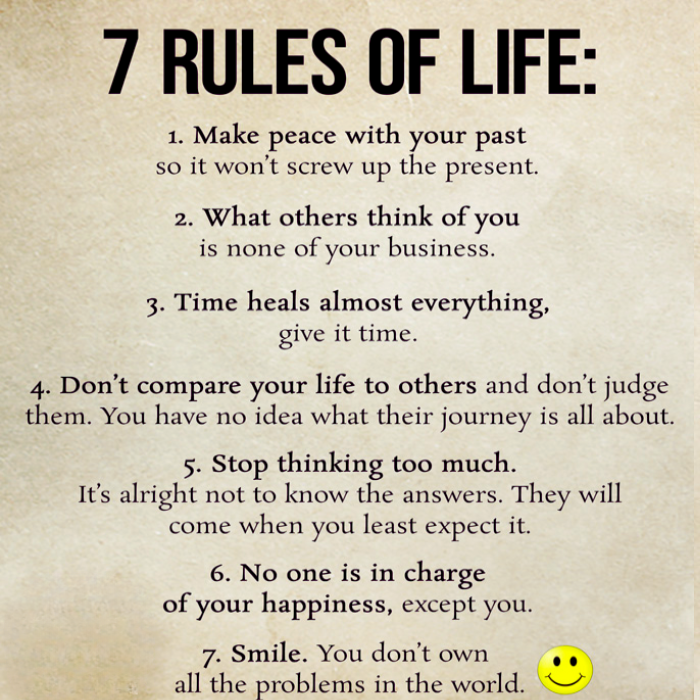
1. Make peace with your past
Your past shapes you but needn’t define you. Acknowledge what happened, learn what you can, and then release its hold. The present moment deserves your full attention—don’t let old wounds steal today’s joy.
2. What others think of you is none of your business
Other people’s opinions reflect their perspectives, not your worth. Focus on living authentically rather than performing for an imagined audience. The only approval that truly matters is your own.
3. Time heals almost everything
Patience is more than a virtue—it’s a necessity. Even the deepest wounds gradually mend when given space and time. Trust the healing process and remember that today’s overwhelming pain will eventually soften.
4. Don’t compare your life to others
Each person walks a unique path with unseen challenges and private victories. The highlight reel you see of others conceals their struggles. Honor your journey without measuring it against anyone else’s.
5. Stop overthinking
The mind makes a wonderful servant but a terrible master. Not every question needs an immediate answer—sometimes understanding emerges naturally when you stop forcing it. Make peace with uncertainty.
6. You are responsible for your own happiness
Happiness isn’t something to find but something to cultivate. No person, achievement, or possession can create lasting joy if you haven’t learned to nurture it from within. Your wellbeing is your most important project.
7. Smile more often
Carrying the weight of every worry serves no one. A genuine smile shifts your perspective, releases tension, and reminds you that life—even with its difficulties—remains beautiful. Some burdens are lighter when you don’t grip them so tightly.
Deeper Reflections
Rule 1: Making Peace with Your Past
The past only has the power you give it. When unresolved experiences dictate your reactions and decisions, you’re living in the shadow of what was rather than the possibility of what is. Making peace doesn’t mean forgetting or minimizing difficult experiences—it means extracting their lessons without carrying their emotional burden. Through forgiveness (of both others and yourself), acceptance, and sometimes professional support, you can transform painful memories from ongoing wounds into sources of wisdom and strength.
Rule 2: Freeing Yourself from Others’ Opinions
We are social creatures naturally attuned to how others perceive us, but this evolutionary trait becomes problematic when it dominates our choices. Remember that others evaluate you through the lens of their own insecurities, values, and limited information. Their judgments often reveal more about them than about you. By releasing the need for universal approval, you reclaim tremendous energy and freedom to live according to your authentic values rather than others’ expectations.
Rule 3: Embracing Time’s Healing Power
Healing rarely follows a predictable timeline or neat stages. Some days bring progress, others regression. The key is continuing forward motion, however gradual. Time’s healing power works best when paired with active processing—reflecting, expressing emotions appropriately, and gradually building new meaning. While scars may remain, time transforms raw pain into something manageable and eventually into wisdom that enriches rather than diminishes your life.
Rule 4: The Liberation of Non-Comparison
Social comparison is a thief of joy. In the age of carefully curated social media, this truth becomes even more significant. When you compare your behind-the-scenes reality to others’ highlight reels, you’ll always come up short. Instead, redirect that energy toward becoming a better version of yourself according to your own values. Celebrate others’ successes without diminishing your own, and recognize that diversity of paths enriches our collective experience rather than providing a scorecard for competition.
Rule 5: Finding Peace Beyond Overthinking
The mind excels at creating problems but often struggles to solve them through the same thinking patterns. Overthinking creates a fog that obscures solutions that might otherwise be apparent. When you find yourself caught in mental loops, step away—engage in physical activity, connect with nature, or simply breathe. Solutions often arrive not through forced concentration but in moments of relaxation when the mind can make connections previously hidden by excessive effort.
Rule 6: Taking Responsibility for Your Happiness
External circumstances influence but never determine your happiness. By understanding that your internal response to events—not the events themselves—creates your experience, you reclaim your power. This doesn’t mean forcing positivity or denying difficulties. Rather, it means consciously cultivating practices that build resilience and joy: gratitude, meaningful connection, purposeful activity, and mindfulness. Your happiness becomes a garden you tend rather than a destination you hope to reach.
Rule 7: The Power of a Genuine Smile
A smile is both a reflection of inner peace and a way to create it. When you smile genuinely—even during challenging times—you activate neural pathways associated with positive emotions. You remind yourself that no matter what problems you face, you aren’t defined by them. This simple act helps maintain perspective, acknowledging that while your challenges matter, they exist alongside countless moments of beauty and connection that deserve equal attention.